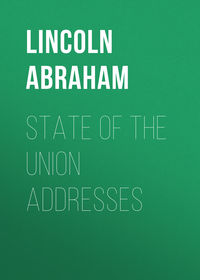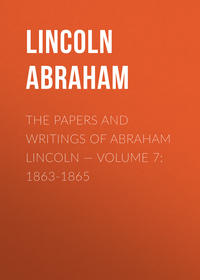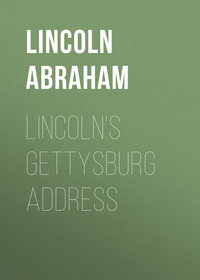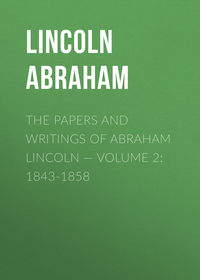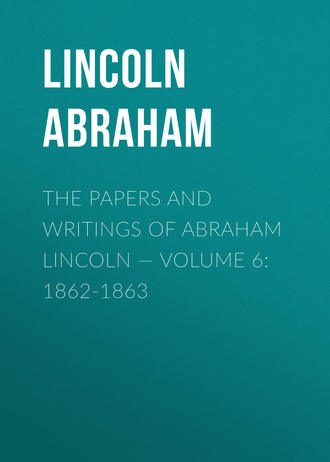 полная версия
полная версияThe Papers And Writings Of Abraham Lincoln — Volume 6: 1862-1863
A. LINCOLN.
TELEGRAM TO GENERAL G. B. McCLELLAN
WAR DEPARTMENT, WASHINGTON CITY, July 14, 1862MAJOR-GENERAL McCLELLAN:
General Burnside's force is at Newport News, ready to move, on short notice, one way or the other, when ordered.
A. LINCOLN.
TO SOLOMON FOOT
EXECUTIVE MANSION, WASHINGTON, July 15, 1862HON. SOLOMON FOOT, President pro tempore of the Senate.
SIR: — Please inform the Senate that I shall be obliged if they will postpone the adjournment at least one day beyond the time which I understand to be now fixed for it.
Your obedient servant,
A. LINCOLN.
[The same message was addressed to Hon. Galusha A. Grow Speaker of the House of Representatives.]
MESSAGE TO CONGRESS. July 17, 1862
FELLOW-CITIZENS OF THE SENATE AND HOUSE OF REPRESENTATIVES:I have inadvertently omitted so long to inform you that in March last Mr. Cornelius Vanderbilt, of New York, gratuitously presented to the United States the ocean steamer Vanderbilt, by many esteemed the finest merchant ship in the world. She has ever since been and still is doing valuable service to the government. For the patriotic act of making this magnificent and valuable present to the country I recommend that some suitable acknowledgment be made.
A. LINCOLN.
MESSAGE TO CONGRESS. July 17, 1862
FELLOW-CITIZENS OF THE SENATE AND HOUSE OF REPRESENTATIVES:Considering the bill for "An act to suppress insurrection, to punish treason and rebellion, to seize and confiscate the property of rebels, and for other purposes," and the joint resolution explanatory of said act as being substantially one, I have approved and signed both.
Before I was informed of the passage of the resolution I had prepared the draft of a message stating objections to the bill becoming a law, a copy of which draft is herewith transmitted.
A. LINCOLN.
FELLOW-CITIZENS OF THE HOUSE OF REPRESENTATIVES:
I herewith return to your honorable body, in which it originated, the bill for an act entitled "An act to suppress treason and rebellion, to seize and confiscate the property of rebels, and for other purposes," together with my objections to its becoming a law.
There is much in the bill to which I perceive no objection. It is wholly prospective, and touches neither person nor property of any loyal citizen, in which particulars it is just and proper. The first and second sections provide for the conviction and punishment of persons Who shall be guilty of treason and persons who shall "incite, set on foot, assist, or engage in any rebellion or insurrection against the authority of the United States or the laws thereof, or shall give aid and comfort thereto, or shall engage in or give aid and comfort to any such existing rebellion or insurrection." By fair construction persons within these sections are not to be punished without regular trials in duly constituted courts, under the forms and all the substantial provisions of law and of the Constitution applicable to their several cases. To this I perceive no objection, especially as such persons would be within the general pardoning power and also the special provision for pardon and amnesty contained in this act.
It is also provided that the slaves of persons convicted under these sections shall be free. I think there is an unfortunate form of expression rather than a substantial objection in this. It is startling to say that Congress can free a slave within a State, and yet if it were said the ownership of the slave had first been transferred to the nation and that Congress had then liberated him the difficulty would at once vanish. And this is the real case. The traitor against the General Government forfeits his slave at least as justly as he does any other property, and he forfeits both to the government against which be offends. The government, so far as there can be ownership, thus owns the forfeited slaves, and the question for Congress in regard to them is, "Shall they be made free or be sold to new masters?" I perceive no objection to Congress deciding in advance that they shall be free. To the high honor of Kentucky, as I am informed, she is the owner of some slaves by escheat, and has sold none, but liberated all. I hope the same is true of some other States. Indeed, I do not believe it will be physically possible for the General Government to return persons so circumstanced to actual slavery. I believe there would be physical resistance to it which could neither be turned aside by argument nor driven away by force. In this view I have no objection to this feature of the bill. Another matter involved in these two sections, and running through other parts of the act, will be noticed hereafter.
I perceive no objection to the third or fourth sections.
So far as I wish to notice the fifth and sixth sections, they may be considered together. That the enforcement of these sections would do no injustice to the persons embraced within them, is clear. That those who make a causeless war should be compelled to pay the cost of it, is too obviously just to be called in question. To give governmental protection to the property of persons who have abandoned it, and gone on a crusade to overthrow the same government, is absurd, if considered in the mere light of justice. The severest justice may not always be the best policy. The principle of seizing and appropriating the property of the persons embraced within these sections is certainly not very objectionable, but a justly discriminating application of it would be very difficult and, to a great extent, impossible. And would it not be wise to place a power of remission somewhere, so that these persons may know they have something to lose by persisting and something to gain by desisting?
[A man without hope is a most dangerous man — he has nothing to lose!]
I am not sure whether such power of remission is or is not in section thirteen. Without any special act of Congress, I think our military commanders, when — in military phrase, "they are within the enemy's country," should, in an orderly manner, seize and use whatever of real or personal property may be necessary or convenient for their commands; at the same time preserving, in some way, the evidence of what they do.
What I have said in regard to slaves, while commenting on the first and second sections, is applicable to the ninth, with the difference that no provision is made in the whole act for determining whether a particular individual slave does or does not fall within the classes defined in that section. He is to be free upon certain conditions but whether those conditions do or do not pertain to him no mode of ascertaining is provided. This could be easily supplied.
To the tenth section I make no objection. The oath therein required seems to be proper, and the remainder of the section is substantially identical with a law already existing.
The eleventh section simply assumes to confer discretionary power upon the executive. Without the law, I have no hesitation to go as far in the direction indicated as I may at any time deem expedient. And I am ready to say now — I think it is proper for our military commanders to employ, as laborers, as many persons of African descent as can be used to advantage.
The twelfth and thirteenth sections are something better than unobjectionable; and the fourteenth is entirely proper, if all other parts of the act shall stand.
That to which I chiefly object pervades most parts of the act, but more distinctly appears in the first, second, seventh, and eighth sections. It is the sum of those provisions which results in the divesting of title forever.
For the causes of treason and ingredients of treason, not amounting to the full crime, it declares forfeiture extending beyond the lives of the guilty parties; whereas the Constitution of the United States declares that "no attainder of treason shall work corruption of blood or forfeiture except during the life of the person attainted." True, there is to be no formal attainder in this case; still, I think the greater punishment cannot be constitutionally inflicted, in a different form, for the same offence.
With great respect I am constrained to say I think this feature of the act is unconstitutional. It would not be difficult to modify it.
I may remark that the provision of the Constitution, put in language borrowed from Great Britain, applies only in this country, as I understand, to real or landed estate.
Again, this act in rem forfeits property for the ingredients of treason without a conviction of the supposed criminal, or a personal hearing given him in any proceeding. That we may not touch property lying within our reach, because we cannot give personal notice to an owner who is absent endeavoring to destroy the government, is certainly not satisfactory. Still, the owner may not be thus engaged; and I think a reasonable time should be provided for such parties to appear and have personal hearings. Similar provisions are not uncommon in connection with proceedings in rem.
For the reasons stated, I return the bill to the House in which it originated.
TELEGRAM TO GENERAL G. B. McCLELLAN
WAR DEPARTMENT, WASHINGTON CITY, D.C., July 21, 1862MAJOR-GENERAL McCLELLAN:
This is Monday. I hope to be able to tell you on Thursday what is to be done with Burnside.
A. LINCOLN.
ORDER IN REGARD TO BEHAVIOR OF ALIENS
WAR DEPARTMENT, ADJUTANT-GENERAL'S OFFICE,WASHINGTON, July 21, 1862.
The following order has been received from the President of the United States:
Representations have been made to the President by the ministers of various foreign powers in amity with the United States that subjects of such powers have during the present insurrection been obliged or required by military authorities to take an oath of general or qualified allegiance to this government. It is the duty of all aliens residing in the United States to submit to and obey the laws and respect the authority of the government. For any proceeding or conduct inconsistent with this obligation and subversive of that authority they may rightfully be subjected to military restraints when this may be necessary. But they cannot be required to take an oath of allegiance to this government, because it conflicts with the duty they owe to their own sovereigns. All such obligations heretofore taken are therefore remitted and annulled. Military commanders will abstain from imposing similar obligations in future, and will in lieu thereof adopt such other restraints of the character indicated as they shall find necessary, convenient, and effectual for the public safety. It is further directed that whenever any order shall be made affecting the personal liberty of an alien reports of the same and of the causes thereof shall be made to the War Department for the consideration of the Department of State.
By order of the Secretary of War:
L. THOMAS, Adjutant-General.
ORDER AUTHORIZING EMPLOYMENT OF "CONTRABANDS."
WAR DEPARTMENT, July 22, 1862Ordered:
1. That military commanders within the States of Virginia, South Carolina, Georgia, Florida, Alabama, Mississippi, Louisiana, Texas, and Arkansas in an orderly manner seize and use any property, real or personal, which may be necessary or convenient for their several commands as supplies or for other military purposes; and that while property may be destroyed for proper military objects, none shall be destroyed in wantonness or malice.
2. That military and naval commanders shall employ as laborers within and from said States so many persons of African descent as can be advantageously used for military or naval purposes, giving them reasonable wages for their labor.
3. That as to both property and persons of African descent accounts shall be kept sufficiently accurate and in detail to show quantities and amounts and from whom both property and such persons shall have come, as a basis upon which compensation can be made in proper cases; and the several departments of this government shall attend to and perform their appropriate parts toward the execution of these orders.
By order of the President: EDWIN M. STANTON, Secretary of War.
WARNING TO REBEL SYMPATHIZERS
PROCLAMATION, JULY 25, 1862THE PRESIDENT OF THE UNITED STATES OF AMERICA:
A Proclamation.
In pursuance of the sixth section of the act of Congress entitled "An act to suppress insurrection and to punish treason and rebellion, to seize and confiscate property of rebels, and for other purposes," approved July 17, 1862, and which act and the joint resolution explanatory thereof are herewith published, I, Abraham Lincoln, President of the United States, do hereby proclaim to and warn all persons within the contemplation of said sixth section to cease participating in, aiding, countenancing, or abetting the existing rebellion or any rebellion against the Government of the United States and to return to their proper allegiance to the United States, on pain of the forfeitures and seizures as within and by said sixth section provided.
In testimony whereof I have hereunto set my hand and caused the seal of the United States to be affixed.
Done at the city of Washington, this twenty-fifth day of July, A.D. 1862, and of the independence of the United States the eighty-seventh.
A. LINCOLN.
By the President: WILLIAM H. SEWARD, Secretary of State.
HOLD MY HAND WHILST THE ENEMY STABS ME
TO REVERDY JOHNSON(Private.)
EXECUTIVE MANSION, WASHINGTON, July 26, 1862.
HON. REVERDY JOHNSON.
MY DEAR SIR: — Yours of the 16th is received......
You are ready to say I apply to friends what is due only to enemies. I distrust the wisdom if not the sincerity of friends who would hold my hands while my enemies stab me. This appeal of professed friends has paralyzed me more in this struggle than any other one thing. You remember telling me, the day after the Baltimore mob in April, 1861, that it would crush all Union feeling in Maryland for me to attempt bringing troops over Maryland soil to Washington. I brought the troops notwithstanding, and yet there was Union feeling enough left to elect a Legislature the next autumn, which in turn elected a very excellent Union United States senator! I am a patient man — always willing to forgive on the Christian terms of repentance, and also to give ample time for repentance. Still, I must save this government, if possible. What I cannot do, of course, I will not do; but it may as well be understood, once for all, that I shall not surrender this game leaving any available card unplayed.
Yours truly,
A. LINCOLN.
TO CUTHBERT BULLITT
(Private.)WASHINGTON, D. C., July 28, 1862.
CUTHBERT BULLITT, Esq., New Orleans, Louisiana.
SIR: — The copy of a letter addressed to yourself by Mr. Thomas J. Durant has been shown to me. The writer appears to be an able, a dispassionate, and an entirely sincere man. The first part of the letter is devoted to an effort to show that the secession ordinance of Louisiana was adopted against the will of a majority of the people. This is probably true, and in that fact may be found some instruction. Why did they allow the ordinance to go into effect? Why did they not assert themselves? Why stand passive and allow themselves to be trodden down by minority? Why did they not hold popular meetings and have a convention of their own to express and enforce the true sentiment of the State? If preorganization was against them then, why not do this now that the United States army is present to protect them? The paralysis — the dead palsy — of the government in this whole struggle is that this class of men will do nothing for the government, nothing for themselves, except demanding that the government shall not strike its open enemies, lest they be struck by accident!
Mr. Durant complains that in various ways the relation of master and slave is disturbed by the presence of our army, and he considers it particularly vexatious that this, in part, is done under cover of an act of Congress, while constitutional guaranties are suspended on the plea of military necessity. The truth is, that what is done and omitted about slaves is done and omitted on the same military necessity. It is a military necessity to have men and money; and we can get neither in sufficient numbers or amounts if we keep from or drive from our lines slaves coming to them. Mr. Durant cannot be ignorant of the pressure in this direction, nor of my efforts to hold it within bounds till he and such as he shall have time to help themselves.
I am not posted to speak understandingly on all the police regulations of which Mr. Durant complains. If experience shows any one of them to be wrong, let them be set right. I think I can perceive in the freedom of trade which Mr. Durant urges that he would relieve both friends and enemies from the pressure of the blockade. By this he would serve the enemy more effectively than the enemy is able to serve himself. I do not say or believe that to serve the enemy is the purpose, of Mr. Durant, or that he is conscious of any purpose other than national and patriotic ones. Still, if there were a class of men who, having no choice of sides in the contest, were anxious only to have quiet and comfort for themselves while it rages, and to fall in with the victorious side at the end of it without loss to themselves, their advice as to the mode of conducting the contest would be precisely such as his is. He speaks of no duty — apparently thinks of none — resting upon Union men. He even thinks it injurious to the Union cause that they should be restrained in trade and passage without taking sides. They are to touch neither a sail nor a pump, but to be merely passengers — deadheads at that — to be carried snug and dry throughout the storm, and safely landed right side up. Nay, more: even a mutineer is to go untouched, lest these sacred passengers receive an accidental wound. Of course the rebellion will never be suppressed in Louisiana if the professed Union men there will neither help to do it nor permit the government to do it without their help. Now, I think the true remedy is very different from what is suggested by Mr. Durant. It does not lie in rounding the rough angles of the war, but in removing the necessity for the war. The people of Louisiana who wish protection to person and property have but to reach forth their hands and take it. Let them in good faith reinaugurate the national authority, and set up a State government conforming thereto under the Constitution. They know how to do it and can have the protection of the army while doing it. The army will be withdrawn so soon as such State government can dispense with its presence; and the people of the State can then, upon the old constitutional terms, govern themselves to their own liking. This is very simple and easy.
If they will not do this — if they prefer to hazard all for the sake of destroying the government — it is for them to consider whether it is probable I will surrender the government to save them from losing all. If they decline what I suggest, you scarcely need to ask what I will do. What would you do in my position? Would you drop the war where it is? Or would you prosecute it in future with elder-stalk squirts charged with rose water? Would you deal lighter blows rather than heavier ones? Would you give up the contest, leaving any available means unapplied? I am in no boastful mood. I shall not do more than I can, and I shall do all I can, to save the government, which is my sworn duty as well as my personal inclination. I shall do nothing in malice. What I deal with is too vast for malicious dealing.
Yours truly,
A. LINCOLN.
TO LOYAL GOVERNORS
WAR DEPARTMENT, WASHINGTON, D.C.,July 28, 1862.
GOVERNORS OF ALL LOYAL STATES:
It would be of great service here for us to know, as fully as you can tell, what progress is made and making in recruiting for old regiments in your State. Also about what day the first regiments can move with you, what the second, what the third, and so on. This information is important to us in making calculations. Please give it as promptly and accurately as you call.
A. LINCOLN.
BROKEN EGGS CANNOT BE MENDED
EXTRACT FROM LETTER TO AUGUST BELMONTJuly 31, 1862.
Broken eggs cannot be mended; but Louisiana has nothing to do now but to take her place in the Union as it was, barring the already broken eggs. The sooner she does so, the smaller will be the amount of that which will be past mending. This government cannot much longer play a game in which it stakes all, and its enemies stake nothing. Those enemies must understand that they cannot experiment for ten years trying to destroy the government, and if they fail, still come back into the Union unhurt. If they expect in any contingency to ever have the Union as it was, I join with the writer in saying, "Now is the time."
How much better it would have been for the writer to have gone at this, under the protection of the army at New Orleans, than to have sat down in a closet writing complaining letters northward!
Yours truly,
A. LINCOLN.
TO COUNT GASPARIN
EXECUTIVE MANSION, WASHINGTON,August 4, 1863.
TO COUNT A. DE GASPARIN.
DEAR SIR — Your very acceptable letter, dated Orbe, Canton de Vaud, Switzerland, 18th of July, 1862, is received. The moral effect was the worst of the affair before Richmond, and that has run its course downward. We are now at a stand, and shall soon be rising again, as we hope. I believe it is true that, in men and material, the enemy suffered more than we in that series of conflicts, while it is certain that he is less able to bear it.
With us every soldier is a man of character, and must be treated with more consideration than is customary in Europe. Hence our great army, for slighter causes than could have prevailed there, has dwindled rapidly, bringing the necessity for a new call earlier than was anticipated. We shall easily obtain the new levy, however. Be not alarmed if you shall learn that we shall have resorted to a draft for part of this. It seems strange even to me, but it is true, that the government is now pressed to this course by a popular demand. Thousands who wish not to personally enter the service are nevertheless anxious to pay and send substitutes, provided they can have assurance that unwilling persons, similarly situated, will be compelled to do likewise. Besides this, volunteers mostly choose to enter newly forming regiments, while drafted men can be sent to fill up the old ones, wherein man for man they are quite doubly as valuable.
You ask, "Why is it that the North with her great armies so often is found with inferiority of numbers face to face with the armies of the South?" While I painfully know the fact, a military man, which I am not, would better answer the question. The fact I know has not been overlooked, and I suppose the cause of its continuance lies mainly in the other facts that the enemy holds the interior and we the exterior lines, and that we operate where the people convey information to the enemy, while he operates where they convey none to us.
I have received the volume and letter which you did me the honor of addressing to me, and for which please accept my sincere thanks. You are much admired in America for the ability of your writings, and much loved for your generosity to us and your devotion to liberal principles generally.





